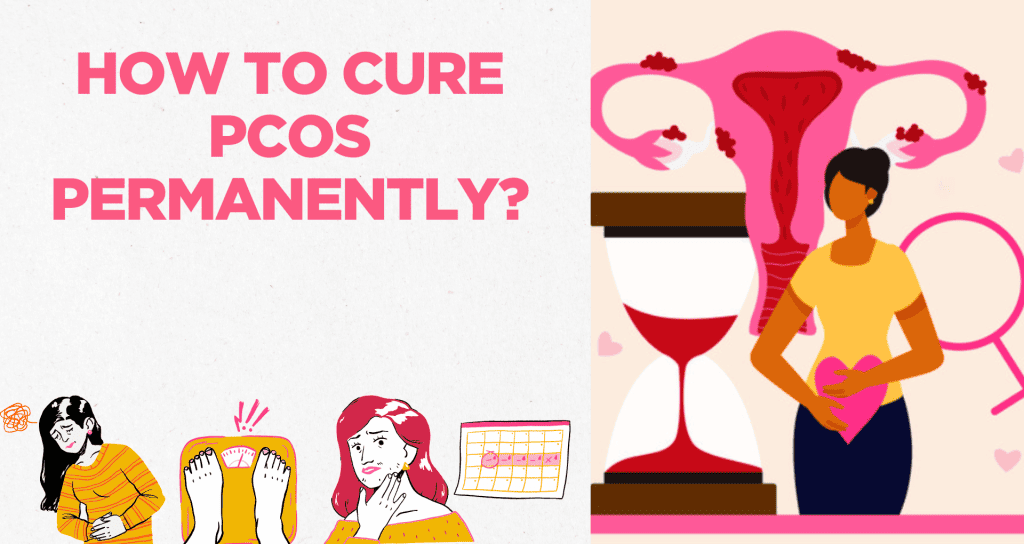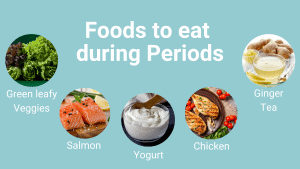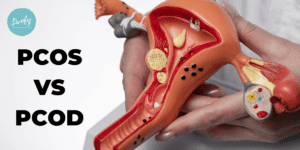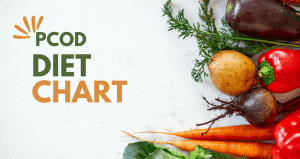Polycystic ovary syndrome (PCOS) is the most common endocrinopathy among adult women in the developed world and is characterized by anovulation, androgen excess (primarily ovarian, but also adrenal in origin) and the appearance of polycystic ovaries on ultrasound. In this, the ovaries generate an excessive amount of androgens – male sex hormones that are produced in women in small amounts. It is a health condition where numerous small cysts form in the ovaries. However, some women with this disorder might not have cysts, while some women without the disorder might develop cysts. This disorder causes various health-related problems which can be improved with some home remedies of PCOS:
- Obesity or massive weight gain
- Ovarian cysts
- Irregular period cycles
- Problems in pregnancy
- Acne and unwanted hair growth
Let us take a dig on how to cure pcos permanently.
What are the causes of PCOS?
While the PCOS meaning is known to all yet the exact cause isn’t fully understood, but there are several factors believed to contribute to its development:
- Hormonal Imbalance: PCOS often involves an imbalance in reproductive hormones, including increased levels of androgens (male hormones) such as testosterone and reduced levels of follicle-stimulating hormone (FSH) and luteinizing hormone (LH). This imbalance can disrupt the normal function of the ovaries.
- Insulin Resistance: Many women with PCOS have insulin resistance, where the body’s cells don’t respond appropriately to insulin, leading to high insulin levels in the blood. This can cause the body to produce more androgens, interfering with the ovaries’ ability to ovulate regularly and this is why research is being carried out to find a solution on how to cure pcod problem permanently.
- Genetics: There’s evidence suggesting a genetic component to PCOS, as it tends to run in families. Women with a family history of PCOS are more likely to develop the condition.
- Inflammation: Chronic low-grade inflammation might also play a role in PCOS, contributing to insulin resistance and affecting ovarian function.
- Lifestyle Factors: Obesity and an unhealthy lifestyle, including poor diet and lack of physical activity, can exacerbate insulin resistance and hormonal imbalances, potentially worsening symptoms of PCOS.
- Environmental Factors: Exposure to certain environmental factors, such as endocrine-disrupting chemicals found in some plastics, can potentially contribute to developing PCOS, though research on this link is ongoing and not fully established. Many confuse PCOS with PCOD. To avoid that confusion you can go through the PCOS vs PCOD blog.
What are the symptoms of PCOS?
Although the endocrine and reproductive features of the disorder may improve with age, the associated metabolic abnormalities, particularly glucose intolerance, may worsen with age. Here we will get an insight about the first signs of PCOS and also about its symptoms:
1. Infertility due to Chronic Anovulation: Women with Polycystic Ovary Syndrome (PCOS) are not completely infertile, but they may face difficulties in conceiving due to the irregularity and unpredictability of their ovulation. Some women with PCOS may conceive later in their lives as their ovulatory function improves. However, many women now opt for treatment earlier in their reproductive years. It is generally challenging to induce ovulation in women with PCOS both safely and successfully, making them one of the most difficult groups to treat and this is why research is being carried out to find a solution on how to cure pcod problem permanently..
2. Skin Disorders: The development of hirsutism, acne or androgenic alopecia in PCOS has been attributed to increased systemic and local production of androgens (see above) that activate abnormal pilosebaceous unit development. Generally, the ontogeny of abnormalities in the pilosebaceous unit tends to proceed from acne in the peri-pubertal period to hirsutism as a young adult to androgenic alopecia in the mature adult.
Other common skin disorders include acanthosis nigricans and an increased frequency of skin tags. Acanthosis nigricans is a dermatologic condition marked by velvety, mossy, verrucous, hyperpigmented skin. It has been noted on the back of the neck, the axillae, the breasts, and the vulva.
3. Gynaecological Cancers: Many gynaecological cancers have been reported to be more common in women with PCOS, including ovarian, breast, and endometrial carcinomas.
4. Sleep Apnea: Women with sleep disorders often complain of daytime sleepiness and fatigue after sleeping and may snore. Interestingly, the traditional treatment for sleep apnea, i.e., continuous positive airway pressure (CPAP), has improved insulin sensitivity, decreased sympathetic output, and reduced diastolic blood pressure in women with PCOS and sleep apnea.
5. Non-alcoholic fatty liver disease (NAFLD). This disorder is fatty infiltration of the liver not due to alcohol abuse that is related to insulin resistance. Affected patients may have no symptoms or have mild, nonspecific symptoms such as fatigue or malaise. It is usually accompanied by elevated serum liver function tests, most commonly transaminases.
6. Type 2 Diabetes Mellitus. The inherent insulin resistance present in many with PCOS, aggravated by the high prevalence of obesity in these individuals, places these women at increased risk for impaired glucose tolerance and type 2 DM. However, periodic rescreening every 3-5 years is recommended in patients with standard glucose tolerance because glucose tolerance tends to worsen with age.
7. Mood Disorders. Women with PCOS appear to be at increased risk for diminished quality of life and mood disorders. Specifically, they suffer from increased rates of anxiety and depression compared to other women.
Women with PCOS had lower quality of life on all seven factors of the modified PCOSQ (emotional disturbance, weight, infertility, acne, menstrual symptoms, menstrual predictability and hirsutism).
How to cure PCOS Permanently at Home?
In the attempt of learning how to cure pcos permanently it is important that we learn to manage PCOS at home first. This involves lifestyle changes such as a balanced diet, regular exercise, stress reduction, and proper sleep. While there’s no known cure, these steps can significantly improve symptoms and overall health.
Ways to Manage PCOS:
- Balanced Diet
- Regular Exercise
- Stress Reduction
- Adequate Sleep
- Balanced Diet: Focus on whole foods, fibre, and low glycemic index (GI) foods to regulate blood sugar levels. Opt for a balanced diet rich in fruits, vegetables, lean proteins, and whole grains. Reduce processed foods, sugars, and refined carbohydrates. Incorporate anti-inflammatory foods like turmeric, omega-3 fatty acids, and antioxidants found in berries to help manage symptoms. This is the first step of how to cure pcos permanently at home.
- Regular Exercise: Regular exercise to improve insulin sensitivity and manage weight. Aim for at least 150 minutes of moderate-intensity exercise weekly. This helps improve insulin sensitivity, aids in weight management and regulates hormone levels.
- Stress Reduction: Practice stress-relief techniques like yoga or meditation to help control hormonal balance. Chronic stress can exacerbate PCOS symptoms. Employ relaxation techniques like deep breathing, meditation, or yoga to reduce stress hormones and support hormonal balance.
- Adequate Sleep: Ensure quality sleep to regulate hormones and support overall health. Prioritize good sleep hygiene, aiming for 7-9 hours per night. Sufficient sleep aids in hormone regulation, reduces insulin resistance, and promotes overall well-being.
Well these are some of the ways to use in your attempt to how to cure pcos permanently by using the home remedies.
Foods to Eat to cure PCOS Permanently?
While the answer to how to cure pcos permanently is still vague as there isn’t a known “cure” for PCOS through diet alone, certain foods can help manage symptoms and improve overall health. A balanced diet focused on specific food groups can positively impact PCOS symptoms:
- Complex Carbohydrates: Opt for whole grains like quinoa, brown rice, oats, and barley instead of refined grains. These have a lower glycemic index and can help manage blood sugar levels.
- High-Fiber Foods: Foods rich in fibre, like fruits, vegetables, legumes, and nuts, can aid in better digestion and help regulate blood sugar levels.
- Lean Proteins: Include lean protein sources such as poultry, fish, tofu, tempeh, and legumes. Protein helps regulate blood sugar and keeps you feeling full for longer.
- Healthy Fats: Incorporate sources of healthy fats like avocados, nuts, seeds, and olive oil. These fats can help with hormone regulation which might help to cure pcos permanently in the long run.
- Anti-inflammatory Foods: Foods rich in antioxidants and anti-inflammatory properties like berries, tomatoes, fatty fish (salmon, mackerel), turmeric, ginger, and green tea may help reduce inflammation associated with PCOS . Thus contributing in your attempt on how to cure pcos permanently.
- Dairy Alternatives: Some women with PCOS benefit from choosing dairy alternatives like almond milk, coconut milk, or soy milk, as they are lower in hormones than conventional dairy thus helping in how to cure pcod problem permanently .
- Spices and Herbs: Certain spices and herbs like cinnamon, fenugreek, and spearmint might help manage insulin levels and hormonal balance.
- Probiotic-Rich Foods: Yogurt, kefir, kimchi, sauerkraut, and other probiotic-rich foods can aid in gut health and may have a positive impact on hormonal balance. You can also look into our PCOS diet chart in order to get proper nutrition.
Home Remedies to cure PCOS Permanently
Significant home remedies include lifestyle changes and herbal remedies to manage the symptoms of PCOS and help with the PCOS treatment. Some of the suggested home remedies on how to cure pcos permanently are listed below:
1. Dietary Changes
Eating healthier foods and avoiding a certain range of ingredients may help in managing the symptoms. A nutritious diet can help in regulating the imbalance in hormones and the irregular menstrual cycle. Avoiding processed, heavily preserved foods can contribute to lowering inflammation and insulin resistance thus contributing to cure pcos permanently.
Tips to keep in mind
- Choose whole foods
- Go for anti-inflammatory foods
- Balance the number of carbs and proteins in your meals
- Increase the iron intake
- Incorporate fiber in the meals for easy digestion
- Increase your magnesium intake
- Avoid coffee
- Incorporate soy products
2. Exercise
High-intensity training with short intervals and running may help control symptoms of PCOS. Sports like swimming and light aerobics can also help to cure pcos permanently.
3. Adaptogen herbs
When the body is unable to regulate insulin, its levels can increase in your body and cause increased levels of androgens. Adaptogen herbs help the body in balancing androgens. Some adaptogen herbs also help to ease symptoms of PCOS, like irregular periods.
- Mulethi – Take a cup of hot water, mix Mulethi root powder in it and use it for two months. This Mulethi tea can be used for longer to have prolonged effects.
- Flaxseeds – Flaxseeds can be consumed by adding to the daily diet in the form of milkshakes and smoothies or they can also be directly consumed which can be beneficial for overall health.
- Aloe Vera Gel – It helps in restoring the levels of a hormone in the ovaries. It is used along with certain other compounds to make formulations to manage the symptoms of PCOS.
- Chamomile Tea – It helps in managing the levels of hormonal imbalance. It can be consumed in the form of tea.
- Cinnamon – It can be used as a tea and can be taken daily. It also comes in tablet forms but they should be consumed after consulting a doctor can contribute to cure pcos permanently.
- Omega 3 Supplements or Fish Oil
3. Good sleep routine
Sleep affects stress levels and helps in regulating cortisol in order to balance the hormones. According to studies, most women go through an unhealthy sleep routine. In order to improve the sleep routine:
- Eight to ten hours of sleep every day
- Fatty foods and stimulants should be avoided before bedtime
- A regular bedtime schedule should be incorporated
4. Do not stress
Reduced stress levels can help regulate cortisol. Activities like yoga and remedies like getting enough sleep, and cutting caffeine, can help in lowering stress levels. Taking long walks and taking out time for self-care can also help in reducing stress which might help cure pcos permanently in the near future.
Expert Review on How to cure PCOS Permanently
PCOS, while not curable, can be managed effectively through lifestyle changes and medical interventions. Focus on a balanced diet rich in whole foods, emphasizing complex carbs, lean proteins, healthy fats, and anti-inflammatory foods like fruits, vegetables, and spices. Regular exercise, aiming for at least 150 minutes per week, aids in weight management and improves insulin sensitivity. Stress management through yoga or meditation can also help regulate hormonal balance. Herbal remedies like fenugreek, cinnamon, and turmeric may complement treatment, but their efficacy varies. Always consult healthcare professionals for a tailored approach. While there’s no definitive cure on how to cure pcos permanently, a holistic lifestyle approach involving diet, exercise, stress reduction, and medical guidance can significantly alleviate PCOS symptoms and improve overall health and thus help in how to cure pcod problem permanently .
References
What is the fastest way to get rid of PCOS?
There’s no instant solution on how to cure pcos permanently. Managing it involves a balanced diet, regular exercise, stress reduction, and medication or medical interventions. Fast solutions aren’t realistic, but a holistic approach can effectively alleviate symptoms over time, improving overall health and hormonal balance thus contributing to cure pcos permanently with time.
Can PCOS be treated permanently?
PCOS isn’t curable, but its symptoms can be managed effectively. Lifestyle changes, medications to regulate hormones, and assisted reproductive technology for fertility issues can help control symptoms. Continuous management and medical guidance can significantly improve quality of life, which may help to cure pcos permanently in the near future.
Which is the best drink to cure PCOS?
There isn’t a single drink to “cure” PCOS, but herbal teas like spearmint tea or beverages with ingredients like fenugreek, cinnamon, or turmeric may aid in managing symptoms.
Which is the best food to cure PCOS?
Foods like whole grains (such as millets), pulses, fresh fruits, vegetables, fenugreek, cinnamon, turmeric, and sesame seeds are beneficial and contribute in improving the pcos condition of women.
How to cure PCOS permanently using natural ways?
Managing PCOS naturally involves a balanced diet, emphasizing whole foods, fruits, vegetables, and spices like cinnamon, fenugreek, and turmeric. Regular exercise, stress reduction through practices like yoga, and herbal remedies may help manage symptoms and thus this answers how to cure pcod problem permanently in the near future.
How to treat PCOS in unmarried girls?
People who have irregular periods, trouble getting pregnant or excessive acne and hair growth should speak to a healthcare professional. Birth control medicines (contraceptive pill) can help regulate the menstrual cycle and reduce symptoms.
How to cure PCOS permanently using natural ingredients?
The answer on how to cure pcos permanently is still being researched on. PCOS doesn’t have a known permanent cure solely through natural ingredients. However, lifestyle changes incorporating a balanced diet rich in whole foods, regular exercise, stress management, and certain natural ingredients like cinnamon, fenugreek, and turmeric may help manage symptoms.








